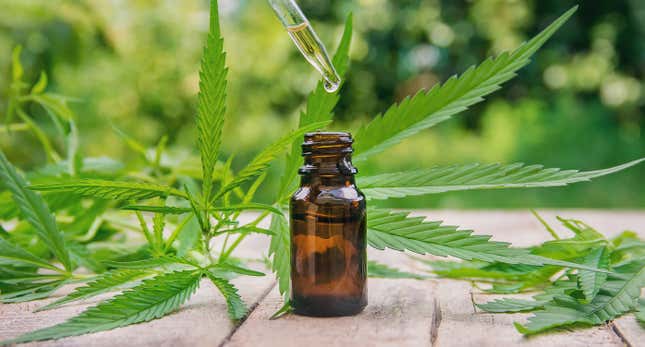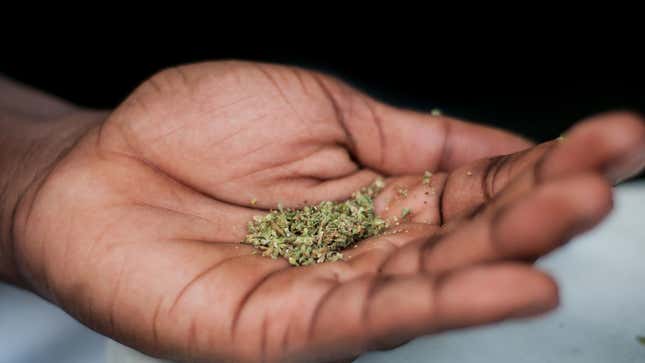
It’s 4/20 and high time for cannabis-infused beauty. According to a recent WWD report, Google searches for “cannabidiol” (CBD) peaked in March; one of the most frequently asked questions: “What is CBD?”
This lack of general consumer awareness, coupled with lax regulations, leaves the door wide open for industry schemes and scams. So let’s get the first part out of the way:
What is CBD?
CBD is short for “cannabidiol,” and it’s a type of cannabinoid.
Cannabinoids are diverse chemical compounds found in hemp plants. There are over 80 cannabinoids found in hemp plants, according to Leafly, each with slightly different effects on the body that are still being studied. CBD is a really popular cannabinoid, and so is THC (tetrahydrocannabinol). THC is the cannabinoid famous for getting people high. CBD is not THC. They are two different compounds with different effects on the body and harvested from different parts of the cannabis plant. THC is found primarily in the mature flowers of marijuana, while CBD is generally extracted from the hemp leaves, stalks and stems. (Fun fact: Not all hemp plants produce marijuana buds. Only female plants bud flowers, which are where THC is concentrated.) CBD, when isolated as a compound, will not produce any type of high for its user.

Why is CBD in so many beauty products now?
CBD gives therapeutic benefits of the cannabis plant without the psychoactive effects of THC. So if slathering on CBD lotion won’t get you stoned, then what does CBD do? Well, according to multiple studies, it does a lot. CBD oil has antioxidant properties that may protect against sun damage and ease psoriasis symptoms. But there may be other benefits to your skin.
“It’s rich in vitamins A, C and E,” dermatologist Dr. Debra Jaliman told DermStore. “Vitamin A stimulates the cells responsible for producing the tissue that keeps skin firm and healthy; vitamin C stimulates collagen production, and it helps to reduce signs of aging; [and] vitamin E blocks free radicals from the body [which] helps slow down the aging process.”
WWD states that beauty and fashion influencers increased their mentions of cannabis by a whopping 61 percent over the past year. The newfound interest in cannabis comes with good reason: Studies have shown evidence of CBD’s ability to also reduce inflammation when topically applied, which may benefit general health as well as beauty. Inflammation is the body’s way of protecting itself from infection, illness or injury. However, inflammation becomes a bad thing when we’re always inflamed. There is also evidence that CBD may help combat those acne breakouts that can target even grown people well past puberty. So CBD products, coupled with proper diet and wellness practices, could be one step in reducing inflammation, clearing up various skin problems and getting your Glow Up on!
What should I be warned about?
You can safely use CBD without the disorientation of feeling “high,” making it useful for all ages. It’s also versatile, with a range of wellness and beauty purposes. Sounds like a winner, hands down—but there are still many questions surrounding this booming trend.
Because this is a new industry, not all of the necessary regulations are in place yet to make sure we’re getting what we pay for. CBD is often marketed as a cosmetic or a “wellness” product; the Food and Drug Administration does not consider it to be a dietary supplement and does not evaluate the safety or purity of CBD products before they appear on the market. The agency also does not allow CBD to be marketed as a medication; in its own words, the FDA “has not approved a marketing application for cannabis for the treatment of any disease or condition.” Because CBD is in this gray, unregulated area, it’s hard to know for sure if our CBD products have enough active ingredients.
As reported by Ali Oshinsky at Into the Gloss:
Most products boasting CBD properties only list cannabis sativa oil (another name—confusingly!—for hemp seed oil) as an active ingredient. Hemp seed oil actually contains no CBD. That’s right—you heard me. For a little clarity, I called up my old team at Knox Medical and spoke to their Manufacturing and Controls Director, Nikolas. “If you do the correct collection method from pure hemp seeds, it actually has no CBD. Or, if it does it’s below the detectable level—it’s very, very low.” Pure hemp seed oil is still a nice, light, non-comedogenic oil—but not much else.
An appropriate regulatory system would give consumers the power to choose products that are genuinely worthy of their labels and claims of health benefits. We also need to know if our products have passed tests for mold (a common problem in cannabis farming), toxins, heavy metals and/or inorganic fertilizers.
And of course, any conversation on cannabis would be remiss to not mention problems within the legal system too. Prisons are overflowing with people of color put there for petty drug charges, while the legal marijuana industry is almost entirely wealthy, white, and male. To keep your cannabis consumerism ethical, consider buying black-owned products, and specifically source from companies looking to help communities of color and those affected by the war on drugs. Check out these black-owned cannabis companies leading efforts for ownership and empowerment during this post-prohibition boom.
Iyana, founder of Kush and Cute:
Iyana, who did not give her last name in her Vice interview last year, launched Kush and Cute, her cannabis skin-care product company, at the end of 2017. “There are more and more people of color rising to notoriety in the [cannabis] space, she told Vice. “But a lot of work needs to be done for it to be considered diverse and inclusive. But we are optimistic that it can be done.”
Cat, owner of Blissful Stoner Body Essentials:
“Funding is a very hard task, especially being black—people are taking that risk on you,” Cat detailed to Bustle earlier this week. The New Orleans-based entrepreneur sells products ranging from bath salts to body oils.
Dorian Morris, founder of Undefined Beauty:
A longtime member of the cosmetics industry, Dorian Morris has worked with Coty, Sundial Brands and Kendo Brands, according to Beauty Independent. “You have these ingredients that work well individually, but when you pair them with CBD, you get pretty powerful results,” she told the site. “I feel very strongly about the democratization of beauty. Although CBD as an ingredient is extremely expensive, I wanted to make sure from a price-point standpoint [it] is very accessible so everyone has access to super efficacious formulas that don’t cost an arm and a leg.”
Tsion “Sunshine” Lencho, co-founder of Supernova Women:
Tsion “Sunshine” Lencho is a Stanford-educated attorney and the co-founder of Supernova Women, an organization that offers networking for women of color interested in entering the cannabis industry. Lencho also offers legal services to cannabis businesses.
Correction: Sept. 22, 2019, 2:40 p.m. ET: This story has been edited to clarify the FDA’s policy regarding CBD products and CBD’s potential beauty benefits. It has also been edited to remove unattributed text and to add fuller sourcing.

